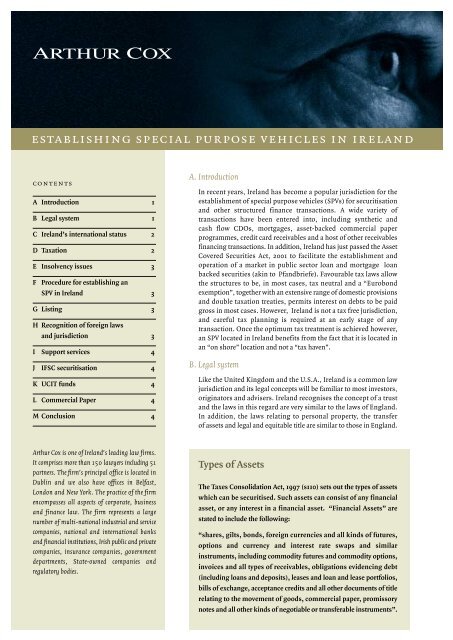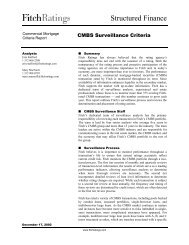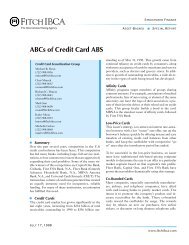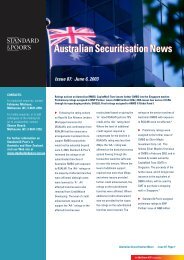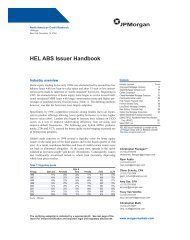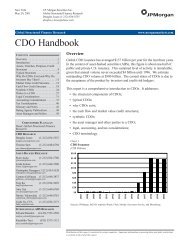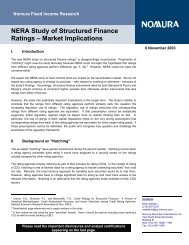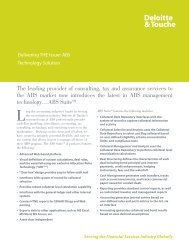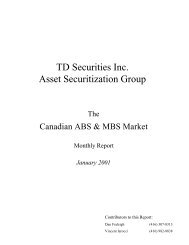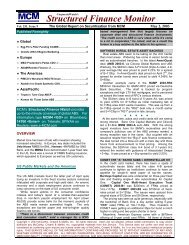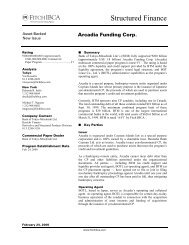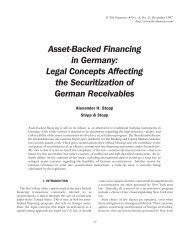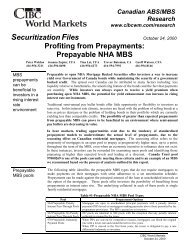Establishing Special Purpose Vehicles in Ireland - Securitization.Net
Establishing Special Purpose Vehicles in Ireland - Securitization.Net
Establishing Special Purpose Vehicles in Ireland - Securitization.Net
Create successful ePaper yourself
Turn your PDF publications into a flip-book with our unique Google optimized e-Paper software.
establish<strong>in</strong>g special purpose vehicles <strong>in</strong> ireland<br />
contents<br />
A Introduction 1<br />
B Legal system 1<br />
C <strong>Ireland</strong>’s <strong>in</strong>ternational status 2<br />
D Taxation 2<br />
E Insolvency issues 3<br />
F Procedure for establish<strong>in</strong>g an<br />
SPV <strong>in</strong> <strong>Ireland</strong> 3<br />
G List<strong>in</strong>g 3<br />
H Recognition of foreign laws<br />
and jurisdiction 3<br />
I Support services 4<br />
J IFSC securitisation 4<br />
K UCIT funds 4<br />
L Commercial Paper 4<br />
M Conclusion 4<br />
A. Introduction<br />
In recent years, <strong>Ireland</strong> has become a popular jurisdiction for the<br />
establishment of special purpose vehicles (SPVs) for securitisation<br />
and other structured f<strong>in</strong>ance transactions. A wide variety of<br />
transactions have been entered <strong>in</strong>to, <strong>in</strong>clud<strong>in</strong>g synthetic and<br />
cash flow CDOs, mortgages, asset-backed commercial paper<br />
programmes, credit card receivables and a host of other receivables<br />
f<strong>in</strong>anc<strong>in</strong>g transactions. In addition, <strong>Ireland</strong> has just passed the Asset<br />
Covered Securities Act, 2001 to facilitate the establishment and<br />
operation of a market <strong>in</strong> public sector loan and mortgage loan<br />
backed securities (ak<strong>in</strong> to Pfandbriefe). Favourable tax laws allow<br />
the structures to be, <strong>in</strong> most cases, tax neutral and a “Eurobond<br />
exemption”, together with an extensive range of domestic provisions<br />
and double taxation treaties, permits <strong>in</strong>terest on debts to be paid<br />
gross <strong>in</strong> most cases. However, <strong>Ireland</strong> is not a tax free jurisdiction,<br />
and careful tax plann<strong>in</strong>g is required at an early stage of any<br />
transaction. Once the optimum tax treatment is achieved however,<br />
an SPV located <strong>in</strong> <strong>Ireland</strong> benefits from the fact that it is located <strong>in</strong><br />
an “on shore” location and not a “tax haven”.<br />
B. Legal system<br />
Like the United K<strong>in</strong>gdom and the U.S.A., <strong>Ireland</strong> is a common law<br />
jurisdiction and its legal concepts will be familiar to most <strong>in</strong>vestors,<br />
orig<strong>in</strong>ators and advisers. <strong>Ireland</strong> recognises the concept of a trust<br />
and the laws <strong>in</strong> this regard are very similar to the laws of England.<br />
In addition, the laws relat<strong>in</strong>g to personal property, the transfer<br />
of assets and legal and equitable title are similar to those <strong>in</strong> England.<br />
Arthur Cox is one of <strong>Ireland</strong>'s lead<strong>in</strong>g law firms.<br />
It comprises more than 150 lawyers <strong>in</strong>clud<strong>in</strong>g 51<br />
partners. The firm's pr<strong>in</strong>cipal office is located <strong>in</strong><br />
Dubl<strong>in</strong> and we also have offices <strong>in</strong> Belfast,<br />
London and New York. The practice of the firm<br />
encompasses all aspects of corporate, bus<strong>in</strong>ess<br />
and f<strong>in</strong>ance law. The firm represents a large<br />
number of multi-national <strong>in</strong>dustrial and service<br />
companies, national and <strong>in</strong>ternational banks<br />
and f<strong>in</strong>ancial <strong>in</strong>stitutions, Irish public and private<br />
companies, <strong>in</strong>surance companies, government<br />
departments, State-owned companies and<br />
regulatory bodies.<br />
Types of Assets<br />
The Taxes Consolidation Act, 1997 (s110) sets out the types of assets<br />
which can be securitised. Such assets can consist of any f<strong>in</strong>ancial<br />
asset, or any <strong>in</strong>terest <strong>in</strong> a f<strong>in</strong>ancial asset. “F<strong>in</strong>ancial Assets” are<br />
stated to <strong>in</strong>clude the follow<strong>in</strong>g:<br />
“shares, gilts, bonds, foreign currencies and all k<strong>in</strong>ds of futures,<br />
options and currency and <strong>in</strong>terest rate swaps and similar<br />
<strong>in</strong>struments, <strong>in</strong>clud<strong>in</strong>g commodity futures and commodity options,<br />
<strong>in</strong>voices and all types of receivables, obligations evidenc<strong>in</strong>g debt<br />
(<strong>in</strong>clud<strong>in</strong>g loans and deposits), leases and loan and lease portfolios,<br />
bills of exchange, acceptance credits and all other documents of title<br />
relat<strong>in</strong>g to the movement of goods, commercial paper, promissory<br />
notes and all other k<strong>in</strong>ds of negotiable or transferable <strong>in</strong>struments”.
2<br />
C. <strong>Ireland</strong>’s <strong>in</strong>ternational status<br />
<strong>Ireland</strong> is a member of the European Union (EU)<br />
and also of the Organisation for Economic<br />
Co-operation and Development (OECD). For<br />
many orig<strong>in</strong>ators and potential <strong>in</strong>vestors, this<br />
is one of the significant advantages of locat<strong>in</strong>g an<br />
SPV <strong>in</strong> <strong>Ireland</strong>. Many other popular locations for<br />
SPVs are not members of these organisations.<br />
Investors <strong>in</strong> some jurisdictions may want to<br />
purchase debt issued by EU/OECD issuers only,<br />
and an <strong>in</strong>ability to access such <strong>in</strong>vestors may<br />
adversely affect the pric<strong>in</strong>g of the transaction.<br />
In addition, there is a current <strong>in</strong>ternational trend<br />
away from <strong>in</strong>vest<strong>in</strong>g <strong>in</strong> so-called tax havens. Some<br />
<strong>in</strong>vestors take comfort from the fact that <strong>Ireland</strong><br />
is not a tax haven and has a developed corporate,<br />
legal and tax regime.<br />
D. Taxation<br />
By far the most important issue for potential<br />
orig<strong>in</strong>ators who wish to locate an SPV <strong>in</strong> <strong>Ireland</strong><br />
is the tax analysis. As discussed above, <strong>Ireland</strong><br />
is neither a tax-free jurisdiction nor a tax haven.<br />
Therefore, diligent tax plann<strong>in</strong>g and careful<br />
structur<strong>in</strong>g is required when locat<strong>in</strong>g an SPV <strong>in</strong><br />
<strong>Ireland</strong>. In particular, the follow<strong>in</strong>g issues should<br />
be considered.<br />
(a)<br />
Withhold<strong>in</strong>g Tax<br />
SPV<br />
Investors<br />
It is obviously crucial to any structure that<br />
payments to <strong>in</strong>vestors can be made gross and<br />
not be subject to any withhold<strong>in</strong>g. If the<br />
securities are issued <strong>in</strong> bearer form, held <strong>in</strong><br />
a clear<strong>in</strong>g system and listed on a recognised<br />
exchange, then payments of <strong>in</strong>terest on the<br />
securities will qualify for the “Eurobond<br />
exemption” and may be made gross. In<br />
circumstances where registered securities are<br />
required to be issued (for example where<br />
(b)<br />
(c)<br />
(d)<br />
securities are be<strong>in</strong>g sold <strong>in</strong>to the US market)<br />
then a certificate-less depository <strong>in</strong>strument<br />
(CDI) structure can be utilised. In the case<br />
of registered securities, <strong>in</strong>vestors can rely<br />
upon the Irish domestic exemption from<br />
withhold<strong>in</strong>g tax which permits <strong>in</strong>terest<br />
payments to a company resident <strong>in</strong> an<br />
EU member state (other than <strong>Ireland</strong>)<br />
or a country with which <strong>Ireland</strong> has a double<br />
tax treaty to be made free from withhold<strong>in</strong>g<br />
tax. This exemption applies automatically<br />
without any application be<strong>in</strong>g required.<br />
<strong>Ireland</strong> is also party to an extensive range of<br />
double taxation treaties.<br />
Entity-level Tax<br />
It is essential to ensure that the SPV is tax<br />
neutral. While the SPV itself is liable to tax at<br />
25%, the tax is applied on the net taxable<br />
profit, which is generally ma<strong>in</strong>ta<strong>in</strong>ed at a<br />
negligible level (as there is no requirement to<br />
make any profit <strong>in</strong> an Irish SPV). This is<br />
achieved by ensur<strong>in</strong>g that the SPV’s tax<br />
deductible expenditure is equal to its <strong>in</strong>come.<br />
Under Section 110 of the Taxes Consolidation<br />
Act 1997, an Irish company <strong>in</strong>volved <strong>in</strong> the<br />
management of F<strong>in</strong>ancial Assets (see page 1)<br />
will be allowed to set-off payments of <strong>in</strong>terest<br />
and pr<strong>in</strong>cipal on securities issued by it aga<strong>in</strong>st<br />
any <strong>in</strong>come or ga<strong>in</strong>s received or made by it<br />
on any F<strong>in</strong>ancial Assets. In addition, swap<br />
payments, payments to service providers and<br />
payments to orig<strong>in</strong>ators under certa<strong>in</strong><br />
subord<strong>in</strong>ated loans (see Profit Extraction<br />
below) will <strong>in</strong> most cases be tax deductible.<br />
It is worth not<strong>in</strong>g that there are no “th<strong>in</strong><br />
capitalisation” rules for SPVs <strong>in</strong> <strong>Ireland</strong> and<br />
therefore no maximum limit to the value of<br />
assets which can be securitised.<br />
Other Taxes<br />
Other tax issues which arise <strong>in</strong>clude stamp<br />
duty and value added tax although most<br />
transactions can be structured <strong>in</strong> ways to<br />
avoid or m<strong>in</strong>imise payment of such taxes.<br />
Profit Extraction<br />
Efficient profit extraction is crucial to any<br />
structured f<strong>in</strong>ance transaction. Extraction<br />
of profits by means of service fees, transaction<br />
costs and swaps will all be tax deductible. In<br />
addition, a relatively new development <strong>in</strong> Irish<br />
tax law permits subord<strong>in</strong>ated loans made<br />
from the orig<strong>in</strong>ator to the SPV at fluctuat<strong>in</strong>g<br />
and potentially high <strong>in</strong>terest rates to<br />
be a deductible expense of the SPV.
establish<strong>in</strong>g special purpose vehicles <strong>in</strong> ireland<br />
(e)<br />
We recommend that profit extraction is an<br />
issue which should be addressed as early as<br />
possible when structur<strong>in</strong>g any transaction.<br />
Revenue Op<strong>in</strong>ions<br />
The Irish Revenue Commissioners will<br />
issue advance op<strong>in</strong>ions <strong>in</strong> respect of the tax<br />
treatment of SPVs, deal<strong>in</strong>g with various<br />
issues <strong>in</strong>clud<strong>in</strong>g the tax deductibility of <strong>in</strong>terest<br />
payments, servic<strong>in</strong>g fees, swap payments,<br />
transaction costs, withhold<strong>in</strong>g tax, value<br />
added tax and any other tax issues which<br />
might be relevant. We normally recommend<br />
that arrangers and orig<strong>in</strong>ators take advantage<br />
of this facility at the <strong>in</strong>itial stage of<br />
any transaction. However, unlike other<br />
jurisdictions, there is no requirement to obta<strong>in</strong><br />
a tax op<strong>in</strong>ion or rul<strong>in</strong>g before proceed<strong>in</strong>g.<br />
E. Insolvency issues<br />
One area of Irish company law which differs<br />
<strong>in</strong> substance from English company law is<br />
<strong>in</strong>solvency. In particular, Irish law provides for<br />
the concept of “exam<strong>in</strong>ership” (a form of court<br />
protection) which, although similar to the concept<br />
of adm<strong>in</strong>istration <strong>in</strong> England, is less favourable to<br />
creditors. For example, secured creditors hold<strong>in</strong>g<br />
float<strong>in</strong>g charges cannot prevent the appo<strong>in</strong>tment<br />
of an exam<strong>in</strong>er. However, provided that the SPV is<br />
structured <strong>in</strong> a bankruptcy remote manner and<br />
engages <strong>in</strong> no other bus<strong>in</strong>ess, this issue ought not<br />
to be problematic (although it often needs to be<br />
expla<strong>in</strong>ed <strong>in</strong> some detail to orig<strong>in</strong>ators, <strong>in</strong>vestors<br />
and rat<strong>in</strong>g agencies).<br />
F. Procedure for establish<strong>in</strong>g an SPV <strong>in</strong> <strong>Ireland</strong><br />
As is the case under English law, for an Irish<br />
company to issue securities to the public, it is<br />
required to be a public limited company (plc).<br />
A plc is required to have a m<strong>in</strong>imum share capital<br />
of 139,000, paid up to one-quarter. Therefore,<br />
before clos<strong>in</strong>g, the SPV will need to be capitalised<br />
<strong>in</strong> an amount of at least 19,750. However, this<br />
money is available to the SPV to be used <strong>in</strong> its<br />
bus<strong>in</strong>ess and is not, as such, a cost of<br />
<strong>in</strong>corporation. From a tim<strong>in</strong>g perspective, it is<br />
recommended that the process of <strong>in</strong>corporation<br />
of an SPV be commenced not less than 30<br />
days prior to the anticipated clos<strong>in</strong>g date.<br />
This is to allow sufficient time for a trad<strong>in</strong>g<br />
certificate to be obta<strong>in</strong>ed and other formalities<br />
to be complied with.<br />
SPVs are usually set up as orphan companies with<br />
their shares be<strong>in</strong>g beneficially held by a charitable<br />
trust. SPVs are required to have at least<br />
two <strong>in</strong>dividuals act<strong>in</strong>g as directors (at least one<br />
of whom must be resident <strong>in</strong> <strong>Ireland</strong>) and the<br />
annual f<strong>in</strong>ancial statements of the SPV are<br />
required to be audited.<br />
G. List<strong>in</strong>g<br />
The Irish Stock Exchange (ISE) has extensive<br />
experience <strong>in</strong> the list<strong>in</strong>g of specialist debt<br />
securities such as those issued by SPVs. The ISE<br />
provides an efficient and comparatively speedy<br />
response time to draft offer<strong>in</strong>g circulars.<br />
Currently, the ISE guarantees comments with<strong>in</strong><br />
three days of receipt of the first draft of an offer<strong>in</strong>g<br />
circular. Any securities listed on the ISE may have<br />
the benefit of mutual recognition <strong>in</strong> other EU<br />
countries which is provided by EU legislation. If<br />
securities are listed <strong>in</strong> <strong>Ireland</strong>, the issuer is<br />
required to ma<strong>in</strong>ta<strong>in</strong> a pay<strong>in</strong>g agent <strong>in</strong> <strong>Ireland</strong><br />
(most <strong>in</strong>ternational pay<strong>in</strong>g agents have a branch <strong>in</strong><br />
<strong>Ireland</strong>). If a list<strong>in</strong>g <strong>in</strong> <strong>Ireland</strong> is be<strong>in</strong>g sought, it is<br />
recommended that the ISE be approached at an<br />
early stage to ensure that it agrees <strong>in</strong> pr<strong>in</strong>ciple to<br />
list the securities.<br />
Tim<strong>in</strong>g Considerations<br />
• Revenue Op<strong>in</strong>ions: Consider obta<strong>in</strong><strong>in</strong>g an advance<br />
op<strong>in</strong>ion at the <strong>in</strong>itial stage.<br />
• Profit Extraction: This should be addressed as early<br />
as possible.<br />
• List<strong>in</strong>g: If a list<strong>in</strong>g is be<strong>in</strong>g sought, the Irish Stock<br />
Exchange should be consulted at an early stage.<br />
• Incorporation: Process should be commenced as<br />
early as possible. Up to 30 days prior to clos<strong>in</strong>g<br />
is recommended.<br />
H.Recognition of foreign laws and jurisdiction<br />
In many <strong>in</strong>ternational transactions, the ma<strong>in</strong><br />
transaction documents will often be governed by<br />
English or New York law (or the laws of the<br />
orig<strong>in</strong>ator) and the parties to those documents<br />
(<strong>in</strong>clud<strong>in</strong>g the SPV) may be required to submit to<br />
the jurisdiction of those courts. All the major<br />
conventions relat<strong>in</strong>g to the govern<strong>in</strong>g law<br />
of contracts and submission to jurisdiction are<br />
<strong>in</strong>corporated <strong>in</strong>to Irish law and Irish courts<br />
will recognise a valid choice of non-Irish<br />
govern<strong>in</strong>g law and submission to the jurisdiction<br />
of non-Irish courts.<br />
3
4<br />
I. Support services<br />
There is a number of <strong>in</strong>stitutions operat<strong>in</strong>g <strong>in</strong><br />
Dubl<strong>in</strong> which provide corporate services to SPVs<br />
(such as adm<strong>in</strong>istration and company secretarial<br />
services). Most <strong>in</strong>ternational banks have a<br />
presence <strong>in</strong> Dubl<strong>in</strong>, so complicated cashflow<br />
models can usually be managed by an Irish<br />
adm<strong>in</strong>istrator.<br />
J. IFSC securitisation<br />
In some cases, the SPV may be located <strong>in</strong> the<br />
International F<strong>in</strong>ancial Services Centre (IFSC)<br />
<strong>in</strong> Dubl<strong>in</strong>. This will provide certa<strong>in</strong> benefits not<br />
otherwise available, <strong>in</strong> particular the tax rate is 10%<br />
(although given that almost no profits are subject<br />
to tax this is less relevant) and <strong>in</strong>terest on<br />
registered notes may be paid free from<br />
withhold<strong>in</strong>g tax to any non Irish resident person,<br />
even those located <strong>in</strong> non tax treaty countries.<br />
However, as this procedure requires prior approval<br />
it is now rarely used, but please contact us if you<br />
would like to discuss this option.<br />
K. UCIT funds<br />
Rather than establish<strong>in</strong>g a special purpose<br />
company to issue debt securities, some orig<strong>in</strong>ators<br />
have structured transactions through a UCIT<br />
Fund. Obviously, this will only suit particular<br />
circumstances and clients but we would be<br />
happy to discuss this option with you.<br />
L. Commercial Paper<br />
S<strong>in</strong>ce February 1998, issuers of asset-backed<br />
commercial paper who meet certa<strong>in</strong> criteria laid<br />
down by the Central Bank of <strong>Ireland</strong> are exempt<br />
from the requirement to hold a bank<strong>in</strong>g licence.<br />
A number of issuers of asset-backed commercial<br />
paper have s<strong>in</strong>ce located <strong>in</strong> <strong>Ireland</strong> rely<strong>in</strong>g on<br />
this exception.<br />
M. Conclusion<br />
By virtue of its favourable tax and corporate laws,<br />
its status as an EU/OECD member and its highly<br />
developed f<strong>in</strong>ancial services <strong>in</strong>dustry and<br />
expertise, <strong>Ireland</strong> is the ideal location for the<br />
establishment of an issuance vehicle for a wide<br />
range of structured f<strong>in</strong>ance transactions.<br />
If you are consider<strong>in</strong>g such a transaction or<br />
would like to discuss any of the issues discussed<br />
above, please contact any of the follow<strong>in</strong>g<br />
Arthur Cox lawyers:<br />
Carol<strong>in</strong>e Devl<strong>in</strong><br />
+353 1 618 0585<br />
cdevl<strong>in</strong>@arthurcox.ie<br />
Cormac Kissane<br />
+353 1 618 0529<br />
cormac.kissane@arthurcox.ie<br />
Mark Saunders<br />
+353 1 618 0524<br />
msaunders@arthurcox.ie<br />
Stephen Hegarty<br />
+353 1 618 0513<br />
shegarty@arthurcox.ie<br />
February 2002<br />
This memorandum is a general summary and is not a complete<br />
statement of the law. It is not <strong>in</strong>tended to give specific legal advice.<br />
If you require advice please contact your usual Arthur Cox contact<br />
or any of the persons listed above.<br />
Dubl<strong>in</strong><br />
Earlsfort Centre<br />
Earlsfort Terrace<br />
Dubl<strong>in</strong> 2, <strong>Ireland</strong><br />
Telephone +353 1 618 0000<br />
Facsimile +353 1 618 0618<br />
—<br />
mail@arthurcox.com<br />
www.arthurcox.com<br />
Belfast<br />
Stokes House<br />
17-25 College Square East<br />
Belfast bt1 6hd, Northern <strong>Ireland</strong><br />
Telephone +44 28 9023 0007<br />
Facsimile +44 28 9026 2650<br />
London<br />
29 Ludgate Hill<br />
London ec4m 7je<br />
England<br />
Telephone +44 20 7213 0450<br />
Facsimile +44 20 7213 0455<br />
New York<br />
570 Lex<strong>in</strong>gton Avenue<br />
28th Floor, New York<br />
ny 10022, USA<br />
Telephone +1 212 579 0808<br />
Fax +1 212 688 3237


